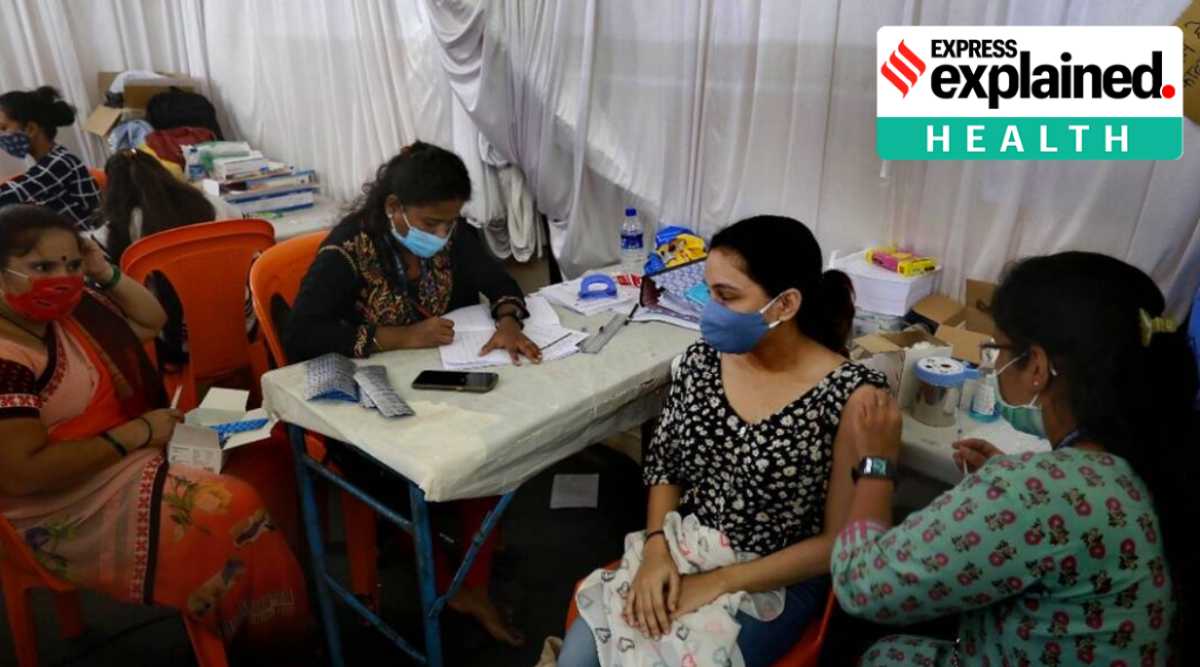Explained: What a study has found on effects of Covid-19 vaccines on menstrual cycles
A new study has looked at the effects of Covid-19 vaccines on women's menstrual cycles. Here are the findings
 A woman gets a shot of a Covid-19 vaccine. (Express File Photo by Amit Chakravarty)
A woman gets a shot of a Covid-19 vaccine. (Express File Photo by Amit Chakravarty)A new study published in the journal Obstetrics & Gynecology published this week has analysed the data of nearly 4,000 US based individuals regarding the effects of Covid-19 vaccines on women’s menstrual cycle.
So far the effects of vaccines on menstrual cycles have been known only anecdotally and this study is one of the first ones to document if vaccines affect the cycles.
The study says that some people may experience slight, but temporary changes in the length of their monthly menstrual cycles following Covid-19 vaccination. This means that for some women who receive Covid-19, their menstrual cycles may start a day later than they are supposed to.
What does the study say?
The study analysed menstrual cycle data using an application called ‘Natural Cycles’. All the individuals are US residents between the ages of 18 and 45 years and had normal menstrual cycles (between 24-38 days) for three consecutive cycles before the first dose of a COVID-19 vaccine.
Out of the 4,000 individuals, 2,403 were vaccinated and about 1,500 were unvaccinated. Most of the vaccinated individuals received the Pfizer-BioNTech vaccine (55 percent) and about 35 percent received the Moderna vaccine. 7 percent received the single-dose Johnson and Johnson vaccine.
Overall, the researchers found that the Covid-19 vaccines being administered in the US were associated with a less than a one day change in the cycle length for both vaccine-dose cycles compared with pre-vaccine cycles.
According to the lead investigator of this study Alison Edelman, the average change is less than one day in the cycle where vaccination has occurred. However, according to Edelman, in some rare instances in which an individual receives two vaccine doses within the same menstrual cycle, the change in cycle length may increase to two days.
Such variances resolve quickly during the next menstrual cycle, according to Edelman. Significantly, the study did not find that the vaccines impact the length of periods or on bleeding.
Limitations of this study
Researchers note that the results of the study may not be generalised to the US population since most users of the Natural Cycles application are likely to be White, college educated and also have lower BMIs than the national distributions and they also do not use hormonal contraception.
Secondly, the scientists note that they chose to analyse a cohort with consistent normal cycle lengths so that they are able to analyse associations between cycle and menses length with Covid-19 vaccines. “We recognize that many individuals who menstruate do not fit into this normal category,” the study says. Therefore, it cannot be said with certainty if other populations experience similar changes in the cycle length.
Thirdly, the study notes that while the results suggest that individuals receiving two doses in a single cycle return to baseline cycle length quickly, the data does not include enough subsequent cycles without vaccines to fully investigate the vaccinated cohort used for this study.
Newsletter | Click to get the day’s best explainers in your inbox
- 01
- 02
- 03
- 04
- 05







































